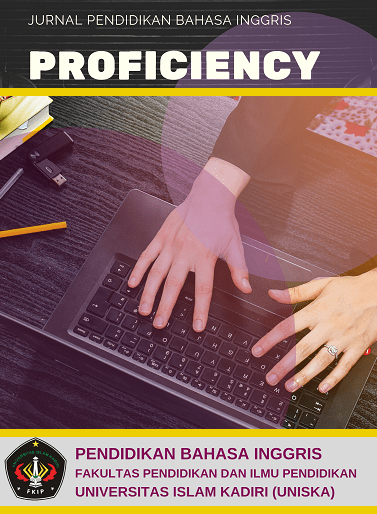THE STUDENTS' PERCEPTION ON OPTIMIZING WHATSAPP TO SUPPORT THE MAIN LISTENING CLASS
Abstract
A few meetings of the main listening class caused the lack for students to practice their listening skill. For new English students, listening skill is more difficult than other English skills. Listening needs more practice than one instance in hearing. The use of the tool in the process of teaching and learning listening skill is very necessary. The optimizing WhatsApp was carried out to give guidance for students to practice their listening skill and they did not only rely on the learning in the main class because the main listening class was carried out only three meetings for three months in Basic Training Class. The research aimed to find out Basic Training Class students’ perception on optimizing WhatsApp to support the main listening class. The researcher used descriptive qualitative research. The data collection technique was observation, interview and documentation. After analysing data, the researcher found that the optimizing of WhatsApp to support the main listening class gives the positive impact. It can be seen from the students’ perception. They are motivated and interested in practicing listening regularly, they don’t only rely on the learning in the classroom, and they can improve their listening skill.
References
Albers, R., Davison, C. J., & Johnson, B. (2015). Inquiry-based learning: Emirati university students choose WhatsApp for Collaboration. Learning and Teaching in Higher Education: Gulf Perspective, 14(2), 37 - 53.
Arfi, V. R., & Fudhla, N. (2021, December). Journal of English Language Teaching, 10(4), 547 - 553.
Bouhnik, D., & Deshen, M. (2014). WhatsApp Goes to School: Mobile Instant Messaging Between Teachers And Students. Journal of Information Technology Education, 13, 218 - 231.
Dewi, S. R. (2019, June). Utilizing WhatsApp Application For Teaching Integrated English (A Case Study At University Of Technology Yogyakarta). REFLEKSI EDUKATIKA : Jurnal Ilmiah Kependidikan, 9, 165 - 171.
Dunlap, J. C. (2006). Using Guided Reflective Journaling Activities to Capture Students' Changing Perceptions. TechTrends, 50(6), 20 - 26.
Fauzi, I. (2021). Teaching English Using WhatsApp During Learning From Home: Impacts To Students And Implication To Teachers. LET: Linguistics, Literature and English Teaching Journal, 11(2), 59 - 78.
Fauzi, I., & Angkasawati, P. (2019). The Use of Listening Logs Through WhatsApp in Improving Listening Comprehension of EFL Students. JOALL (Journal of Applied Linguistics and Literature), 4(1), 13 - 26.
Ghee, T. T., Terng, H. f., & Chui, H. C. (2019). Students’ Perception of WhatsApp as an Effective Medium for Enhancing Listening Skill in Foreign Language Learning. Pertanika Journal of Social Sciences & Humanitis, 27(2), 833 - 845.
KavaliauskienÄ—, G. (2011). Blended Learning in ESP Listening . English for Specific Purposes World, 10(31).
Marleni, L., Sari, N., & Hardi, V. A. (2021). Listening Comprehension by using Video in Online Class Through WhatsApp. Al-Ishlah: Jurnal Pendidikan, 504-514.
Mbukusa, N. R. (2018). Perceptions of students’ on the Use of WhatsApp in Teaching Methods of English as Second Language at The University of Namibia. Journal of Curriculum and Teaching, 7(2), 112 - 119.
Nugroho, A., & Atmojo, A. E. (2020). Digital Learning Of English Beyond Classroom: EFL Learners' Perception And Teaching Activities. JEELS (Journal of English Education and Linguistics Studies), 7(2), 219 - 243.
Nurjanah, Miranti, I., & Dwiastuty, N. (2018, January). The Correlation Between Students' Habit In Listening Song And Students' English Listening Skill. DEIKSIS, 10(01), 43 - 48.
Oktaviani, H. (2021). The Effect Of Using Songs To Increase Young Learners' Vocabulary Achievement Through WhatsApp. Jurnal Ilmiah STBA, 7, 075 - 085.
Purba, J. I., Hutagalung, A. Y., Pakpahan, E. T., Manurung, P. S., & Napitupulu, S. (2022, February). Listening Problems In Private Course. Multiscience, 121 - 126.
Rajabi, P., Mahmoodi, K., & Hosseini, S. A. (2021). Flipped Classroom Model and Its Impact on Iranian EFL Learners' Classroom Anxiety And Listening Performance. Computer-Assisted Language Learning Electronic Journal (CALL-EJ), 22, 1 - 16.
Sari, F. W. (2021). A Study on The Students' Perception of Utilizing WhatsApp as A Tool of Teachibg Listening to Assist Distance Language Learning. Cakrawala Bahasa Jurnal Ilmiah Prodi Pendidikan Bahasa Inggris, 10(1), 13 - 17.
Setyowati, Y. (2019). Let’s Listen Through WhatsApp: An energizing listening exercise in EFL Class. Journal of Physics: Conference Series, 1-5.
Siregar, S. D., Melati, E., & Wahyuni, S. (2021). Self-assessment Optimization Through WhatsApp Features for Increasing Students' Listening Comprehension. English Journal for Teaching and Learning, 09(01), 13-24.
Tendiami, A. (2017). The Use of Communicative Approach In Foreign Language Learning Through Listening Activity By Using WhatsApp Application. 1st English Language and Literature International Conference (ELLiC), 23-29.
Terng, H. F., Heng, L. T., & Yih, M. B. (2021). Utilizing WhatsApp Messenger to Enhance Listening Skills of Civil Engineering Degree Students in Mandarin Course at UiTM Penang Branch. International Journal of Modern Languages and Applied Linguistics, 51-60.
Wijaya, A. (2018). Students' Responses Toward The Use Of WhatsApp In Learning. Journal of Teaching & Learning English in Multicultural Contexts, 2, 47 - 55.
Woottipong, K. (2014, August). Effect of Using Video Materials in The Teaching of Listening Skills for University Students. International Journal of Linguistics Macrothink Institute, 6(4), 200 - 212.
Zebua, E. P. (2020). The Analysis of The Students' Perception Toward Online Learning in Listening Subjects During Pandemic TIme of Covid 19. Didaktik, 14(2), 2448 - 2453.
































